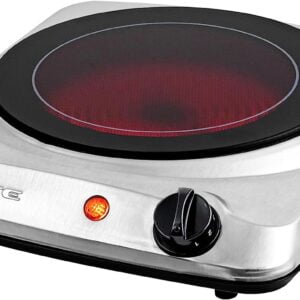Gas Grills
No Results Found
The page you requested could not be found. Try refining your search, or use the navigation above to locate the post.
An Ultimate Guide To Gas Grills
Gas grills are outdoor cooking appliances that use propane or natural gas as the fuel source to cook food. They are popular among home cooks and grill enthusiasts due to their convenience, quick heat-up time, and easy temperature control. Gas grills come in various sizes, styles, and price ranges, making them suitable for different needs and preferences.
Key Features and Components:
Burners: Gas grills typically have one or more burners that emit flames to cook the food. The number of burners determines the cooking area and the ability to cook different dishes simultaneously.
Ignition System: Most gas grills feature electronic ignition systems, allowing you to start the grill quickly with a push of a button.
Cooking Grates: The cooking grates are the surface on which you place the food for grilling. They can be made of stainless steel, cast iron, or porcelain-coated materials.
Lid: Gas grills come with a lid that helps to retain heat, cook food evenly, and add flavor by trapping the smoke.
Heat Control: Gas grills offer precise temperature control through knobs or dials, allowing you to adjust the flame intensity.
Side Burners: Some gas grills may have additional side burners for cooking side dishes or sauces while grilling.
Warming Racks: Many gas grills come with warming racks, which are located above the cooking grates, to keep already cooked food warm.
Grill Carts and Shelves: Gas grills often have storage space in the form of carts or shelves for holding grilling tools, condiments, and other accessories.
BTU Rating: The BTU (British Thermal Unit) rating represents the grill’s heat output. While a higher BTU can indicate greater heat potential, other factors, such as design and materials, also affect grilling performance.
Advantages of Gas Grills:
Convenience: Gas grills are easy to start and heat up quickly, allowing you to start cooking almost instantly.
Temperature Control: Gas grills offer precise temperature control, allowing you to adjust the heat to cook various foods perfectly.
Versatility: Gas grills can handle a wide range of foods, from burgers and steaks to vegetables, seafood, and even pizzas.
Easy Cleanup: Gas grills are generally easier to clean than charcoal grills, as there is no ash residue to deal with.
Less Smoke: Gas grills produce less smoke compared to charcoal grills, making them suitable for use in areas with stricter fire regulations.
Gas Grill Safety Tips:
Proper Ventilation: Always use your gas grill outdoors in a well-ventilated area to prevent the buildup of gas fumes.
Check for Leaks: Before using the grill, inspect the gas connections for leaks by applying a soap and water solution and looking for bubbles.
Keep the Grill Clean: Regularly clean the grill, especially the burners and the cooking grates, to prevent grease buildup, which can cause flare-ups.
Avoid Flare-Ups: Trim excess fat from meat to reduce flare-ups, and have a spray bottle of water on hand to control flare-ups if they occur.
Proper Storage: When not in use, store your gas grill in a safe, dry place, and cover it to protect it from the elements.
Gas grills are a fantastic addition to any outdoor cooking setup. Whether you’re grilling for a small family dinner or hosting a barbecue party, gas grills offer convenience and versatility to create delicious meals with ease. As with any cooking appliance, follow safety guidelines, maintain your grill properly, and enjoy the pleasure of outdoor grilling.


